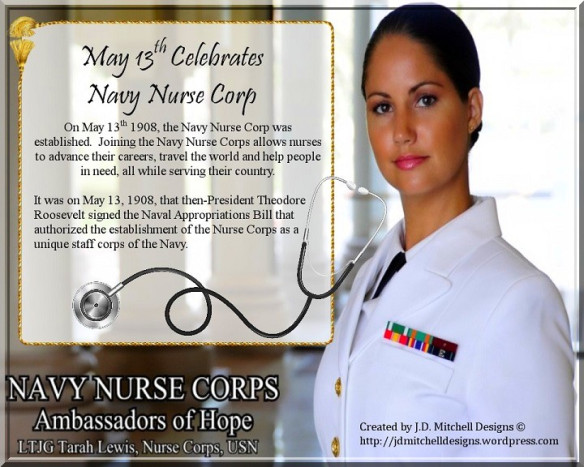Navy Nurses: The Backbone of Their Field
Story by Seaman Angelina Grimsley
National Nurses Day, on May 6, marks the beginning of National Nurses Week. It ends on May 12, which is Florence Nightingale’s birthday. Nightingale was a British social reformer and statistician and is considered the founder of modern nursing. She is most well-known for her work at soldiers’ bedsides during the Crimean War in the 1850s.
Nurses are the “backbone” of the medical field, supporting doctors and patients alike. Much like Nightingale, military nurses provide care to those who must keep healthy in order to serve and defend our country.
For nurses like the aircraft carrier USS John C. Stennis’ (CVN 74) Senior Nursing Officer, Lt. Cmdr. Autumn Riddell, from Gardiner, Maine, this added dimension of responsibility is yet another level of pride to an already indispensable job.
“I had been working in the emergency department of a small hospital for six years while in college, and I knew I wanted to do something more than that,” said Riddell.
Riddell said the Navy Nurse Corps represents a vast medical field comprised of 19 subspecialties with options to specialize within each area, so it is difficult to characterize the role of any Navy nurse as typical. She explained that over the course of her naval career, she has served in various positions that have ranged from catching a baby that was delivered before the mother could make it to the hospital, to comforting a patient as they took their last breath.
Navy nurses must be prepared to change roles as their command changes, Riddell said. She has had the opportunity to write policies, develop training programs, and fly with the Army Dustoff Association and the Air Force Pararescue Team (also known as PJs). The Army Dustoff Association provides aeromedical evacuation to troops, and the Air Force PJs provide en route care to critically injured Sailors, Marines, and local nationals in humanitarian and combat environments.
Though Navy nurses serve fellow military personnel in several ways, there is a role every nurse fulfills at every command, and that is educating others in their field. It is vitally important that they pass on their knowledge, training, and experience to other Sailors so they can diagnose and treat troops.
“One thing that is consistent in our practice as Navy nurses is that we are here to provide training to hospital corpsmen, preparing them to serve independently on the front lines,” said Riddell.
That training is especially important in times like these when all hands – civilian and military – are looking for ways to treat those who have been infected with COVID-19. Hospital ships USNS Mercy (T-AH-19) and USNS Comfort (T-AH-20) recently deployed to Los Angeles and New York, respectively, with medical personnel from several other Navy ships supporting them.
The theme of this year’s National Nurses Week is “Nursing the World to Health,” fitting for the tremendous efforts being put forth against the pandemic by nurses worldwide.
Riddell said it is challenging for her to not be out there with her colleagues on the front lines providing direct patient care during this time, but she has been busy aboard John C. Stennis by adapting programs provided by the ship’s medical department in order to mitigate risk. As a result of COVID-19, she has collaborated with colleagues throughout the Navy medical community to stay up to speed on the changes rolling out on a daily basis across the fleet.
Riddell is not alone in her camaraderie and dedication. They are traits of her profession, rooted in a rich history dating back to 1908 when a group of nurses dubbed “The Sacred Twenty” became the first female members to ever serve in the United States Navy. The Navy Nurse Corps’ 112th birthday immediately follows National Nurses Week on May 13. The Sacred Twenty were required to travel to Washington, D.C. for their written and oral examinations, pay for their own room and board during assignments, and were not granted full military rank until 1944. Despite the hardships of their roles as pioneers in the Navy, they persevered for the sake of service, and Riddell said, in her opinion, being a Navy nurse is worth it.
“I have been fortunate to have been able serve in every role I have had,” said Riddell. “I’ve been in the Navy for 14 years this August, and by far, being a nurse in the Navy has been an incredibly rewarding experience.”
Now, more than ever, the Navy and the world are celebrating the hard work and dedication of nurses.
The John C. Stennis is partnering with Newport News Shipbuilding to complete Refueling Complex Overhaul on schedule with a trained, resilient and cohesive crew.



